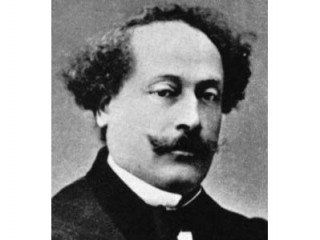
Alexandre Dumas (En.) biography
Date of birth : 1802-07-24
Date of death : 1870-12-05
Birthplace : Soissons, France
Nationality : French
Category : Famous Figures
Last modified : 2015-08-03
Credited as : Writer and historical novelist, wrote novels as , and
1 votes so far
Alexandre Dumas was born on July 24, 1802, near Soissons, France, the son of a Creole general of the French Revolutionary armies. His grandfather was from a noble family, and his grandmother had been a Dominican slave. Dumas's father died when he was four years old, leaving the family with very little money. Dumas was not a very good student, but his handwriting was noticeably beautiful, and he studied to work as a notary (a public officer who witnesses the signing of important documents and makes them official). He also began writing musical comedies and then historical plays in collaboration (working together with others) with a poet friend named Adolphe de Leuven. Historical subjects, as well as his ability to collaborate, were to be permanent elements of Dumas's work during his career.
Dumas then found work as a secretary to the Duke of Orléans (later King Louis Philippe, 1773–1850) in Paris, France. He read and attended the theater as much as he could during his time off. He was greatly influenced by the works of William Shakespeare (1564–1616) and wrote his first plays in 1825 and 1826. Others followed, with Henri III et sa cour (1829) bringing him great success and popularity. The revolution of 1830 slowed down Dumas's writing, and he became a strong supporter of the Marquis de Lafayette. His political activities were viewed unfavorably by the new king, his former boss, and he was forced to leave France for a time. A series of amusing travel books resulted from this period of exile.
His fiction
When Dumas returned to Paris, he began writing a new series of historical plays. By 1851 he had written alone, or in collaboration with others, more than twenty plays. He also began writing fiction at this time, first short stories and then novels. In collaboration with Auguste Maquet he wrote Les Trois Mousquetaires (1844; The Three Musketeers ), Vingt Ans après (1845; Twenty Years After ), and Le Vicomte de Bragelonne (1850). Le Comte de Monte-Cristo (1846; The Count of Monte Cristo ) was also a product of this period.
Dumas worked with many collaborators who helped him with the outlines of his romances. The scale of his "fiction factory" has often been exaggerated. Although at least a thousand works were published under his own name, most were due to his own hard work and amazing imagination. Dumas's works were received with enthusiasm by his loyal readers, and he earned a lot of money. He could never earn enough to keep up with his spending habits, however. Among his problems was his estate of Monte-Cristo in Saint-Germain-en-Laye, France, which attracted many hangers-on and female admirers who Dumas ended up supporting.
Later life
Dumas, who had never changed his political opinions, was pleased by the Revolution of 1848 and even ran as a candidate for the Assembly. In 1850 the Theâtre-Historique, which he had founded to present his plays, failed. After Napoleon III (1808–1873) took power in 1852, Dumas went to Brussels, Belgium, where his secretary managed to straighten out his affairs to a degree. Here he continued to write constantly.
In 1853 Dumas returned to Paris and began the daily paper Le Mousquetaire, which was devoted to art and literature. The paper survived until 1857, and Dumas then published the weekly paper Monte-Cristo. This in turn folded after three years. In 1860 he was named keeper of museums in Naples, Italy. After remaining there for four years, he returned to Paris, where he found himself deep in debt and regularly chased by debt collectors. He also had many women friends who expected—and received—expensive gifts from him.
Working hard to pay his debts, Dumas produced a number of works of lower quality, among them Madame de Chamblay (1863) and Les Mohicans de Paris (1864), which were not very successful. His unhappy last years were softened by the presence of his son, Alexandre, and his daughter, Madame Petel. (The elder Alexandre Dumas is generally called Dumas père to distinguish him from his son, known as Dumas fils, who was also a dramatist and novelist.) Dumas père died in poverty on December 5, 1870.
















